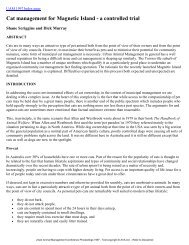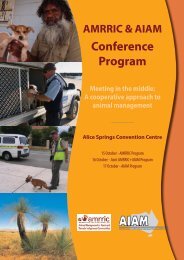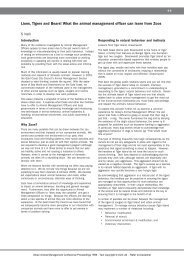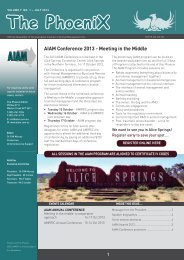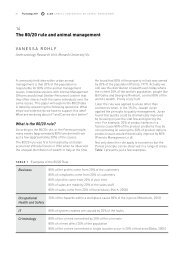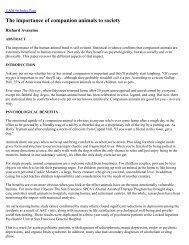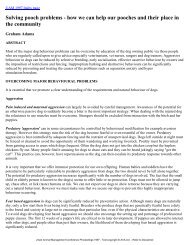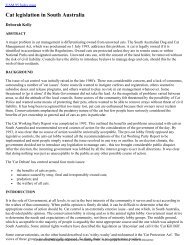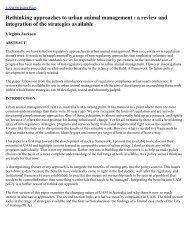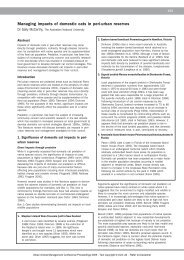Proceedings OF ThE - Australian Institute of Animal Management Inc
Proceedings OF ThE - Australian Institute of Animal Management Inc
Proceedings OF ThE - Australian Institute of Animal Management Inc
Create successful ePaper yourself
Turn your PDF publications into a flip-book with our unique Google optimized e-Paper software.
Annual Conference on <strong>Animal</strong> <strong>Management</strong> AIAM <strong>Proceedings</strong> 2012 81<br />
must be initiated more than a decade in advance <strong>of</strong><br />
peaking<br />
Not surprisingly cultural diversity is going to be a<br />
huge business driver for many local governments<br />
particularly in our larger capital and regionally cities.<br />
Failing to acknowledge or consider cultural diversity<br />
in your Strategic <strong>Animal</strong> <strong>Management</strong> Plan could<br />
have disastrous implications.<br />
Peak oil<br />
The wide use <strong>of</strong> fossil fuels has been one <strong>of</strong> the most<br />
important stimuli <strong>of</strong> economic growth and prosperity<br />
since the industrial revolution. It is believed however<br />
that when oil production decreases, human culture,<br />
and our modern technological society will be forced<br />
to change drastically. The impact <strong>of</strong> peak oil will<br />
depend heavily on the rate <strong>of</strong> decline and the<br />
development and adoption <strong>of</strong> effective alternatives.<br />
In Feb 2010, it was predicted that by 2012, surplus<br />
oil production capacity could entirely disappear, and<br />
as early as 2015, the shortfall in output could reach<br />
nearly 10 million barrels per day.<br />
While it is difficult to predict precisely what economic,<br />
political, and strategic effects such a shortfall might<br />
produce, it surely will reduce the prospects for<br />
growth in both the developing and developed worlds.<br />
Such an economic slowdown would exacerbate<br />
other unresolved tensions, push fragile and failing<br />
economies further down the path toward collapse,<br />
and likely to have a serious global economic impact.<br />
At best, it will lead to periods <strong>of</strong> harsh economic<br />
adjustment. To what extent conservation measures,<br />
investments in alternative energy production, and<br />
efforts to expand petroleum production from tar<br />
sands and shale would mitigate such a period <strong>of</strong><br />
adjustment is difficult to predict.<br />
In 2005, the United States Department <strong>of</strong> Energy<br />
published a report titled Peaking <strong>of</strong> World Oil<br />
Production: Impacts, Mitigation, & Risk <strong>Management</strong>.<br />
Known as the Hirsch report, it stated, “The peaking<br />
<strong>of</strong> world oil production presents the U.S. and the<br />
world with an unprecedented risk management<br />
problem. As peaking is approached, liquid fuel<br />
prices and price volatility will increase dramatically,<br />
and, without timely mitigation, the economic, social,<br />
and political costs will be unprecedented. Viable<br />
mitigation options exist on both the supply and<br />
demand sides, but to have substantial impact, they<br />
Given this prediction, the cost <strong>of</strong> fossil fuel is likely<br />
to influence the global financial landscape leaving in<br />
its wake destruction and mayhem. If putting food on<br />
the table and keeping a ro<strong>of</strong> over our heads becomes<br />
a lot tougher what status or place will companion<br />
animals have in our lives…is the scenario likely to be<br />
more dumped pets?<br />
ClIMAte CHAnge<br />
Whilst Australia’s climate is changing and its<br />
impacts are now being witnessed globally (i.e.<br />
rainfall, temperature change and extreme weather<br />
events) there is still great uncertainty about what it<br />
might mean to local government. However, a little<br />
crystal balling leads you to believe that climate<br />
change will not just impact on coastal settlements,<br />
infrastructure and buildings, it is very likely that<br />
its effects will be widespread and that no part <strong>of</strong><br />
Australia will be immune from it.<br />
Densely populated urban areas will likely face a<br />
different suite <strong>of</strong> problems than the less densely<br />
populated regional towns. Similarly, coastal areas<br />
will face different challenges to inland areas. Local<br />
government as the agency responsible for land<br />
use planning, infrastructure, asset development,<br />
operation and maintenance, as well community<br />
well-being and safety will need to have a better<br />
understanding <strong>of</strong> climate change science.<br />
Climate change will lead to uncertainties and<br />
implications to land use planning, building and<br />
design across the residential, commercial and<br />
infrastructure sectors, and is an important<br />
prerequisite in considering the design <strong>of</strong> new<br />
development and retr<strong>of</strong>itting existing development.<br />
The majority <strong>of</strong> science on climate change decisions<br />
are being made or developed at the global or national<br />
level with minimal support provided to regional and/<br />
or local events. For example, the ability to model the<br />
areas potentially vulnerable to sea-level rise and<br />
storm surge is an essential first step to addressing<br />
the risk. The majority <strong>of</strong> <strong>Australian</strong>s and their pets<br />
live close or adjacent to the coast and as such<br />
present a problem on a massive scale.



